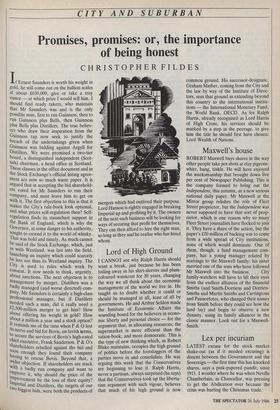CITY AND SUBURBAN
Promises, promises: or, the importance of being honest
CHRI S T 0 PHER FILDES
f Ernest Saunders is worth his weight in gold, he will come out on the bullion scales at about £650,000, give or take a troy ounce — at which price I would sell him. I should find ready takers, who maintain that Mr Saunders was and is the only possible man, first to run Guinness, then to run Guinness plus Bells, then Guinness plus Bells plus Distillers. The true believ- ers who draw their inspiration from the Guinness tap now seek to justify the breach of the undertakings given when Guinness was bidding against Argyll for Distillers. We were promised a two-tier board, a distinguished independent (Scot- tish) chairman, a head office in Scotland. These clauses in the office document and in the Stock Exchange's official listing agree- ment are now so much waste paper. It is argued that in accepting the bid sharehold- ers voted for Mr Saunders to run their Company, and must leave him to get on with it. The first objection to this is that it makes the City's rule-book look optional, and what prices self-regulation then? Self- regulation finds its staunchest support in the Bank of England, which is why the Governor, at some danger to his authority, sought to extend it to the world of whisky. That was bold and timely. As much cannot be said of the Stock Exchange, which, just as with Westland, was last into the field, launching an inquiry which could scarcely be less use than its Westland inquiry. The City is used to rules which work by consent. It now needs to think, urgently, about sanctions. The next objection is to management by merger. Distillers was a badly managed (and worse directed) com- pany, Mr Saunders is certainly a high-class professional manager, but if Distillers needed such a man, did it really need a £2,500-million merger to get him? How about offering his weight in gold? How about a million a year and a stock option? It reminds me of the time when P & 0 lost its nerve and bid for Bovis, on lavish terms, to secure the services of Bovis's high-rated chief executive, Frank Sanderson. P & O's shareholders rebelled against the bid and soon enough they found their company having to rescue Bovis. Beyond that, a wider objection. If shareholders are stuck with a badly run company and want to improve it, why should the price of the Improvement be the loss of their equity? Imperial and Distillers, the targets of our two biggest bids, were both the products of mergers which had outlived their purpose. Lord Hanson is rightly engaged in breaking Imperial up and profiting by it. The owners of the next such business will be looking for ways of securing that profit for themselves. They can then afford to hire the right man, so long as they and he realise who has hired whom.


















































 Previous page
Previous page